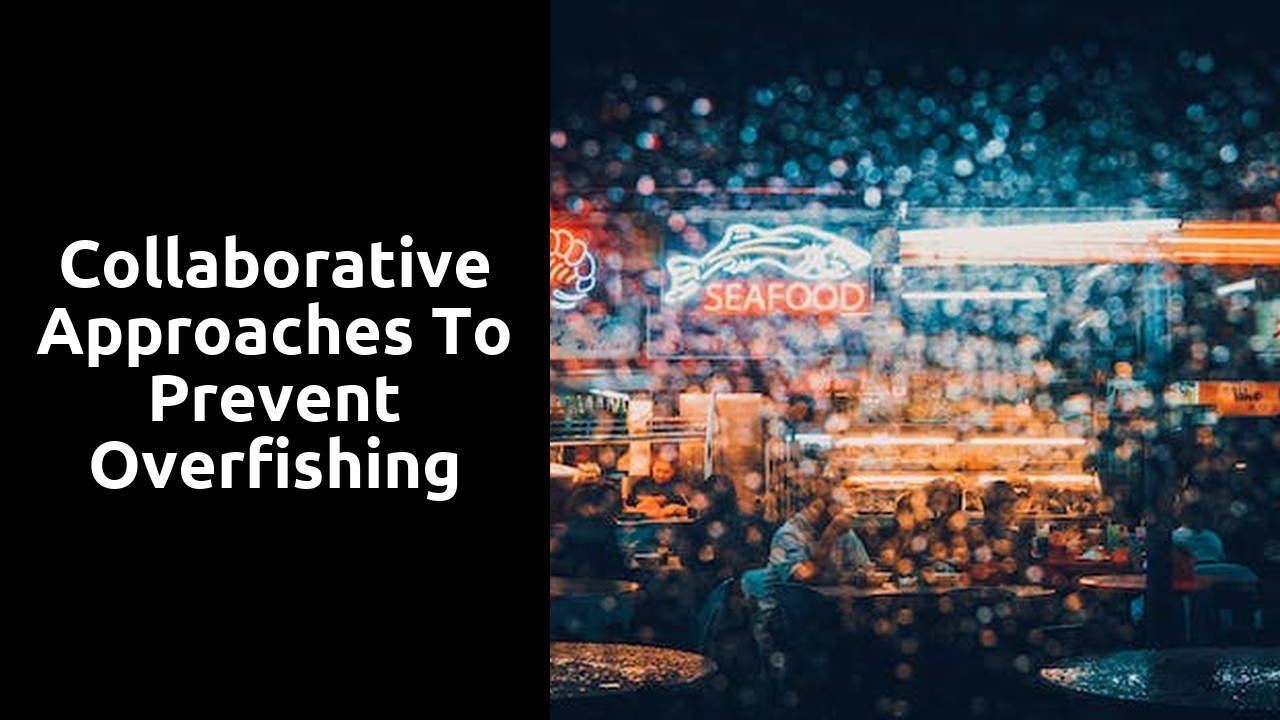Collaborative Approaches to Prevent Overfishing

Combating Overfishing: A Collective Effort
Overfishing is a critical issue that requires a collective effort from governments, NGOs, fisheries management organizations, and local communities. It is not a problem that can be successfully addressed by any single entity alone. By working together, we can create a sustainable future for our oceans and ensure the long-term health of marine resources.
Collaboration is essential in combating overfishing because it allows for the pooling of knowledge, expertise, and resources. Through partnerships and alliances, stakeholders can share best practices, exchange data and information, and develop innovative solutions for sustainable fisheries. This collective effort enables us to leverage the diverse perspectives and strengths of different actors, leading to more effective and comprehensive approaches to overfishing prevention. Together, we can make a significant impact and protect the fragile balance of our oceanic ecosystems.
Uniting for Sustainable Fisheries
Uniting for Sustainable Fisheries
In the battle against overfishing, one key strategy that has shown immense promise is the concept of uniting for sustainable fisheries. This approach recognizes that the issue of overfishing is not one that can be tackled in isolation by individual stakeholders, but rather requires collective effort and collaboration. By bringing together various stakeholders - including governments, fishing communities, scientists, and environmental organizations - we can leverage the power of synergy to address the root causes of overfishing and implement effective solutions.
Uniting for sustainable fisheries involves fostering dialogue and cooperation among stakeholders who may have different interests and perspectives. It requires overcoming barriers and building trust, so that all parties can work towards a common goal of preserving fish stocks and ensuring the long-term viability of our oceans. This collaborative approach also opens up opportunities for knowledge sharing, innovation, and the exchange of best practices. By pooling together resources, expertise, and efforts, we can create a united front that is better equipped to implement and enforce sustainable fishing practices, as well as develop and implement effective policies to curb overfishing.
The Power of Cooperation in Protecting Marine Resources
The power of cooperation in protecting marine resources cannot be understated. When different stakeholders come together and work towards a common goal, they can achieve remarkable results. In the context of overfishing prevention, collaboration between governments, fishing industries, scientists, and environmental organizations is crucial.
One example of this power of cooperation can be seen in the establishment of marine protected areas (MPAs). MPAs are areas of the ocean that are set aside and managed for the conservation and sustainable use of marine resources. By bringing together various stakeholders and implementing regulations to protect these areas from overfishing, MPAs have proven to be effective in replenishing fish populations and preserving marine biodiversity. This collaborative approach ensures that not only are fish stocks protected, but also the delicate balance of the entire marine ecosystem is safeguarded.
Strategies for Effective Overfishing Prevention
Strategies for Effective Overfishing Prevention
To effectively combat overfishing, it is crucial to implement a combination of strategies that address the root causes and consequences of this issue. Firstly, it is essential to establish and enforce strict fishing regulations that limit the amount of catch allowed and protect endangered species. These regulations should be supported by monitoring and enforcement mechanisms to ensure compliance. Additionally, implementing quotas and catch limits can help regulate fishing activities and prevent the depletion of fish stocks.
Education and awareness campaigns are also vital in promoting sustainable fishing practices. This involves educating fishermen and the general public about the importance of preserving marine ecosystems and the long-term benefits of sustainable fishing. By raising awareness about the negative impacts of overfishing and promoting responsible fishing practices, we can create a culture of sustainability that values the preservation of our oceans for future generations.
Building Bridges for a Sustainable Future
Building bridges for a sustainable future requires the collective efforts of governments, fishing communities, and conservation organizations. It is crucial to establish strong partnerships and collaborations to address the complex challenges of overfishing. By working together, we can develop effective strategies and implement sustainable fishing practices that will ensure the long-term health of our oceanic ecosystems.
Collaboration among stakeholders is essential for creating a comprehensive approach to overfishing prevention. This involves sharing knowledge, resources, and expertise to develop innovative solutions. By fostering an environment of trust and cooperation, we can overcome barriers and find common ground to tackle the issues at hand. Together, we can build a brighter future where the bounty of our oceans is preserved for generations to come.
Harnessing Collaboration to Preserve Oceanic Ecosystems
Effective collaboration is essential in preserving oceanic ecosystems and preventing overfishing. By working together, governments, environmental organizations, and fisheries can create comprehensive strategies to address the underlying causes of overfishing and implement sustainable fishing practices. Collaboration allows for the exchange of knowledge and expertise, enabling stakeholders to make informed decisions and take coordinated action towards long-term conservation efforts.
One key aspect of collaboration in preserving oceanic ecosystems is the establishment of partnerships between different stakeholders. This includes collaboration between government agencies, scientists, fishing communities, and non-governmental organizations. By bringing together diverse perspectives and resources, these partnerships can enhance the effectiveness of conservation initiatives. For example, governments can provide the necessary regulatory framework and enforcement capabilities, while scientists can share their research findings to inform decision-making. Fishing communities can contribute traditional knowledge and practical insights, while non-governmental organizations can advocate for sustainable practices and provide support for local initiatives. Through collaborative efforts, these partnerships can create a synergy that is greater than the sum of its parts, leading to more impactful conservation outcomes.
Related Links
Case Studies: Successful Examples of Overfished Stocks RecoverySolutions for Sustainable Fisheries Management
Effects of Overfishing on Local and Indigenous Communities
Economic Implications of Overfishing for Fishing Communities
Strategies to Combat Overfishing and Restore Fish Stocks
Role of Governments in Regulating Overfishing
Global Overfishing Crisis: A Threat to Ocean Biodiversity
Causes and Consequences of Overfishing